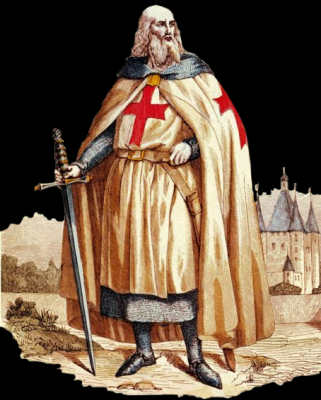World History
Related: About this forumWho were the Knights Templar?
The Knights Templar was an order of devout Christians founded in Jerusalem sometime between A.D. 1118 and 1119, after the First Crusade (1096-1099). The Order was created to protect Europeans traveling to the Holy Land, among other duties. The knights were known across Europe as an elite fighting force with a strict code of conduct and, eventually, immense wealth. For nearly 200 years, the Knights Templar were at the center of politics and finance in Europe and took part in the Christian military campaigns in the Holy Land.
The Order of the Poor Knights of the Temple of Jerusalem, abbreviated to the Knights Templar, was created by Hugues de Payens, a French nobleman who had remained in Jerusalem after visiting sometime between 1114 and 1116. The name came from the Templar headquarters, located on the Temple Mount, in a wing of the Al-Aqsa Mosque, which, at the time, served as a royal palace, rumored to be built on top of the ruins of the Temple of King Solomon, Discover magazine reported in 2020.
The Templars were first organized as a charity, acting as bodyguards to pilgrims traveling to and from the Holy Land. "They would set up patrols to protect people coming from the ports — in particular, from Jaffa, which was the main port closest to Jerusalem," Barber said. "Mostly, it was to deal with bandits and brigand groups, not to fight big battles against large forces, which, of course, they wouldn't be able to do in such small numbers."
The Knights Templar were officially recognized by King Baldwin II of Jerusalem in 1120, at the Council of Nablus. The king assigned tax revenues to the group to keep them clothed and fed. Before this, the knights were supported by donations from the Order of St. John of the Hospital in Jerusalem, also known as the Knights Hospitaller, which the pope approved in 1113.
The idea of Christians using violence to defend the faith was a controversial topic in the Middle Ages, with theologians such as St. Augustine of Hippo discussing
how to reconcile the pacifist teachings of Jesus with fighting for spiritual gains, according to Malcolm Barber, emeritus professor of history at the University of Reading in the U.K.
https://www.livescience.com/knights-templar.html

AllaN01Bear
(28,280 posts)ie, sinclair oil, etc.
 /revision/latest?cb=20090729102006
/revision/latest?cb=20090729102006
yellowdogintexas
(23,578 posts)their destruction by the King of France and the possibility that a few of them escaped to Scotland, then Iceland and eventually the upper NorthEast part of North America.
Lots of fun.
mopinko
(73,227 posts)it was interesting but i wonder if it's accurate at all.
said fuck a lot, which i'm pretty sure came later.
mark hamill is in it so that was fun.
left-of-center2012
(34,195 posts)Early usage:
... the earliest known use of the word 'fuck' that clearly has a sexual connotation":
in English court records of 1310–11, a man local to Chester is referred to as "Roger Fuckebythenavele", probably a nickname.
"Either this refers to an inexperienced copulator, referring to someone trying to have sex with the navel, or it's a rather extravagant explanation for a dimwit, someone so stupid they think that this is the way to have sex", says Booth.
An earlier name, that of John le Fucker recorded in 1278, has been the subject of debate, but is thought by many philologists to have had some separate and non-sexual origin.
https://en.wikipedia.org/wiki/Fuck